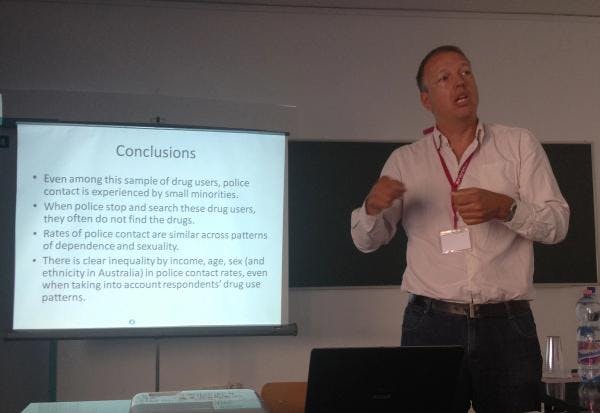European association of criminologists hosts drug policy panels in Budapest
Professor Alex Stevens of Kent University, most recently the author of Drugs Crime and Public Health: The Political Economy of Drug Policy (2011) chaired an ISSDP (International Society for the Study of Drug Policy) panel at the European Society of Criminology (Eurocrim) in Budapest last week (September 5). Stevens said that one of the aims of having an ISSDP panel at Eurocrim was to explore further collaboration with criminologists on drug policy in Europe. ISSDP is trying to expand and deepen its engagement across the world, holding its most recent annual conference in Bogota, Colombia. Next year’s meeting will be in Rome.
Stevens says, “Criminology should be a natural fit with drug policy studies since both are multi-disciplinary, but it is my experience that drug policy is quite marginal in criminology conferences.” Asked why that is the case, he says he doesn’t really know, but that attention tends to go to issues of high-level theory and imprisonment. He speculates that the general disinterest may be due to the fact that criminologists take it for granted that drug use should not be criminalized. Stevens’ hopes that criminologists will have more exposure to drug policy may well be realized since a Eurocrim Board member who was in the audience last Thursday was so enthused by the ISSDP panel that he suggested the Board might consider a plenary session on drug policy at next year’s conference.
The interdisciplinary ISSDP panel consisted of Katherine Pettus, a political theorist , Niamh Eastwood, a barrister and ED of Release, Ian Hamilton, a public health nurse and lecturer at York University, and Marianne van Ooyen Houben, a policy researcher at the Ministry of Justice in the Netherlands. Pettus’ presentation entitled “Legitimacy, Drug Control and Human Rights,” identified what she called an illegitimate (unpromulgated )“stealth” human right to be drug free as a driver of global drug policy. Eastwood stressed that decriminalizing possession in and of itself is not sufficient unless the model applied is meaningful and has the requisite impact, which is to divert people away from the criminal justice system. Hamilton presented the results of a time series analysis of hospital admissions for cannabis psychosis, which rose following the UK decision to increase the classification of cannabis from class C to class B, and van Ooyen Houben discussed the Dutch government’s move to impose stricter controls on coffee shops selling cannabis, which resulted in more young people accessing the illegal market and no measurable reduction of what a few government opponents had framed as “nuisance.”
Stay tuned for a more detailed report on this and other conference presentations, including Alex Stevens’ and Krzysztof Krajewski’s panel on social bias in the policing of drug users in the UK and Australia, and a comparison between Polish and Portuguese policies.
Please, click here to read the new call for abstracts for the ISSDP Rome conference.
Read below the full report.
Keep up-to-date with drug policy developments by subscribing to the IDPC Monthly Alert
